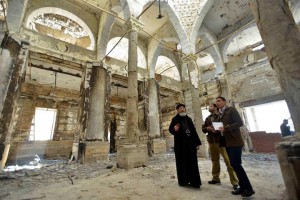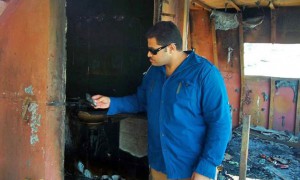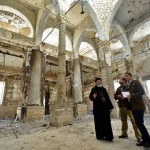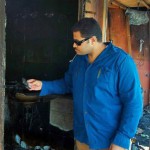
Rights activist Mina Thabet (center) and others examine church building set ablaze on Aug. 14, 2013. (Courtesy of Mina Thabet)
ISTANBUL (Morning Star News) – One year after the attacks, Mina Thabet can still see the ruins in his mind; a seemingly endless series of scorched, hollowed-out church buildings, schools, homes and businesses stretching out across Egypt.
On Aug. 14, 2013, thousands of Muslims began a four-day rampage throughout the country seeking revenge for the military-backed, popular ouster of the Islamist president Mohamed Morsi. They attacked anything remotely associated with Christ, Christians or Christianity.
When it was over, Thabet, a well-known Coptic human rights activist, went to survey the damage. He said it was a life-changing experience.
“I visited Minya – it was awful,” he said. “When I got to the Corniche area, I saw how much damage had been done, and I saw the bathroom that had what remained of two people who were burned alive inside.”
A year has passed since the attacks, but Mina and others say that Christians are still struggling to rebuild their lives. After the first day of attacks, then-Defense Minister Abdel Fattah El-Sisi, now the nation’s president, publicly promised that the army would restore all church buildings destroyed in the attacks. Only five of the 32 destroyed church buildings have been rebuilt.
More importantly, Mina and others said, Christians have received no government assistance to replace more than 100 homes, businesses and other personal property lost in the attacks.
“There were three stages for rebuilding and renovating churches,” Mina said. “Of the three stages, they haven’t finished the first step, which doesn’t even include 10 churches. They haven’t done anything to help the people.”
Mayhem
The August 2013 violence was the most widespread act of persecution of Christians in Egyptian history. Although only six Copts were killed, a small figure compared with other attacks on Copts, the number and variety of places attacked dwarfs other instances of violent persecution in the country.
Property damage estimates still vary, but human rights activists and church officials generally say that 32 church buildings were destroyed; 25 burned down, and seven looted and then torn to pieces by mobs. Additionally, 15 other church buildings, including monasteries, were severely damaged along with eight Coptic-run schools, two buildings on church compounds and an orphanage belonging to Christian social service groups. One of the monasteries lost was more than 1,600 years old.
Days after the attack, Egyptian officials publicly promised to rebuild all of the destroyed church buildings. Instead, the government opened an account for Egyptians to make donations to rebuild, and donations fell flat. The rebuilding was supposed to take place in three stages, with the first stage to be completed at the end of June.
“The first stage included 10 places, five of them are churches and five of them are schools or church associations,” said Ishak Ibrahim, freedom of religion and belief officer with the Egyptian Initiative for Personal Rights. “But the work is going so slow that people are still going out to pray on top of the ruins of their old churches.”
Some churches have opted to forge ahead with renovations and rebuilding and not wait for the army to do the work, Ibrahim said.
“We are very disappointed, because it has been a year and no government officials have come out publicly and announced their plan as to what churches are going to be fully or partial renovated,” he said.
Lost Homes, Businesses
Copts who lost homes and businesses in the attacks have largely been left to fend for themselves, human rights activists said. The Coptic-owned Watani Weekly estimated that Copts sustained 65 million Egyptian pounds (US$9.09 million) in personal losses from the attacks.
“As for the individual Copts, neither the government or the army provided any financial or material support to them,” Ibrahim said. “The support is only limited to the churches and church associations.”
Charities, aid agencies and churches have provided most of the relief that Copts have received, he said.
“Some of the pharmacies that were burned – their owners received some help from the pharmacy bar, such as options to pay for their stocks of drugs over a longer period of time, or they gave them some small loans to start over again,” he said.

Thabet with charred cell phone of Copt killed on tour ferry set on fire by Islamists in Minya on Aug. 14, 2013. (Courtesy of Mina Thabet)
Wael Ibrahim, manager of the Assuit branch of the Egyptian Bible Society (EBS), was one of those caught in the middle. Last August Ibrahim watched helplessly from a distance as a group of Morsi supporters destroyed his store. The mob set it on fire along with Bibles and other Christian literature inside. He estimated the losses at 230,000 Egyptian pounds (US$32,000).
The Assuit EBS is a private business run by a religious association, so it was unclear whether it qualified to be rebuilt by the army, but rather than wait for the government, the store decided to rebuild on its own using association funds. The store was finished three weeks ago.
Wael Ibrahim said an officer on security detail at the store’s opening told him to apply for compensation from the army.
“He told me to go to their financial office and submit a receipt with all our rebuilding expenses for reimbursement,” he said.
Lax Prosecution
Adding to the Copts suffering is the government’s lack of prosecution for any of the attacks.
Although hundreds of Muslim Brotherhood members have been arrested and tried for attacks against police, military and other government targets during the rampage, not one person has been convicted of attacking Christian property. Many of those convicted, including some 1,212 who were sentenced to death by a judge in Minya, were found guilty of committing acts of terror or for the murder of a police officer. But no one has been tried for killing any of the Copts who were slain, for the church burnings or for damage to private property. None of the imams who called for Muslims to attack Christian were ever prosecuted.
As disastrous as the attacks were –– many Copts refer to it as “the nightmare” – they did have good effects for Christians in the country, many Copts have said. Different denominations reached out to each other in a spiritual climate that most often had been fractious at best. Even a year later, Christians are still holding 24-hour prayer meetings.
“We believe that God is going to do something majestic,” one Christian said.
If you or your organization would like to help enable Morning Star News to continue raising awareness of persecuted Christians worldwide with original-content reporting, please consider collaborating at https://morningstarnews.org/donate/?
###
© 2014 Morning Star News. Articles/photos may be reprinted with credit to Morning Star News. https://morningstarnews.org
Morning Star News is a 501(c)(3) non-profit corporation that relies solely on contributions to offer original news reports of persecuted Christians. By providing reliable news on the suffering church, Morning Star News’ mission is to empower those in the free world to help and to encourage persecuted Christians that they are not forgotten or alone. For free subscription or to make tax-deductible donations, contact [email protected], or send check to Morning Star News, 24310 Moulton Parkway, Suite O # 157, Laguna Hills, CA 92637, USA.
- Rights activist Mina Thabet (center) and others examine church building set ablaze on Aug. 14, 2013. (Morning Star News)
- Thabet with charred cell phone of Copt killed on tour ferry set on fire by Islamists in Minya on Aug. 14, 2013. (Morning Star News)



Speak Your Mind